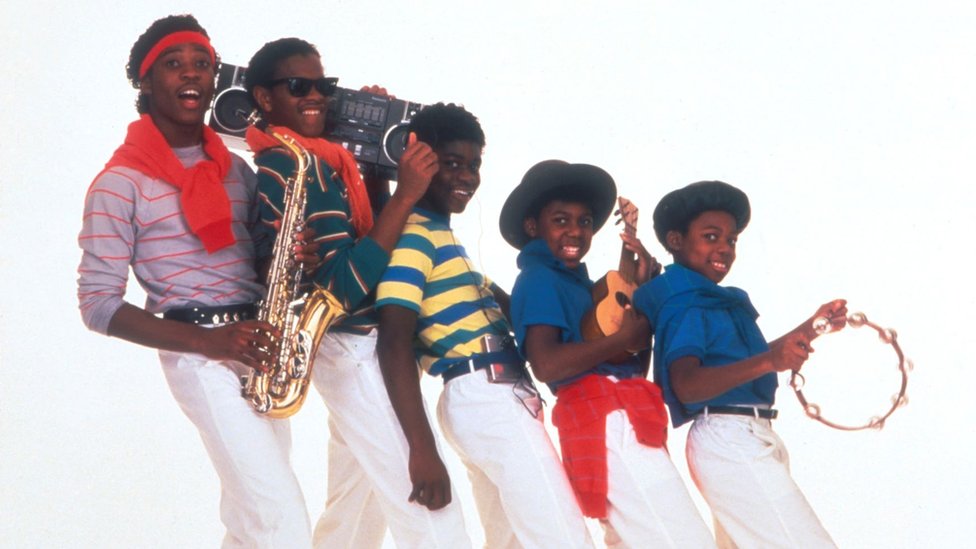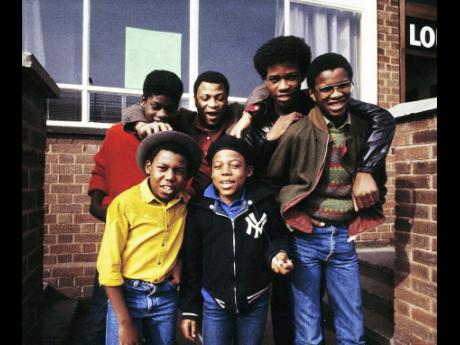Musical Youth: We Were The First Black Act On MTV
31 Oct 2022
“Musical Youth is unique. It’s organic, hence we never discussed well in 40 years time, do you know you’re still going to be recognised,” says Dennis Seaton, as he settles into his seat.
He is right. Achieving worldwide recognition for their music whilst simultaneously breaking barriers for Black music artists, the career trajectory of Musical Youth is one of legends. No one could have predicted that 5 young lads from Birmingham would all become permanent fixtures in music history at just the tender age range of 10-17 years old.

Coincidentally, this month marked 40 years since their iconic song, ‘Pass The Dutchie’ topped the UK Charts. “That’s right. It would have been out number one this week 40 years ago went to number one in 1982.” Dennis confirms.

Produced by Peter Collins, the single immediately became a staple track in Black households worldwide. Born out of struggle and poverty, the lyric “how does it feel when you got no food” resonated particularly with the Black British community. With the Margaret Thatcher era in full swing, unemployment had reached disastrous levels leading to civil unrest all over the country. “What we were battling against was the far right, causing problems for everybody you had to be aware of it at all times.”
Looking for an outlet to combat their surroundings, the boys turned to music. Formed in 1979, the group comprised of two sets of brothers, Frederick Waite Jnr, Patrick Waite Jnr, Michael Grant and Kelvin Grant. Though not a member, Dennis Seaton would be around to help during rehearsals.
Gigging became second nature to the talented bunch. They played mostly in their local West Indian working men’s clubs. “We were playing to our own, it’s only eroded over the last how many years. I think that sense of community was because our parents were first generation West Indians and Africans coming in. We needed to go to our own clubs, like we went to our own churches and stuff. That’s kind of gone now, ” Dennis shares.

At the time, Frederick Waite Snr, father of the Waite brothers, had been the lead singer of the band. When asked if the transition from Waite Snr to Seaton had been smooth, both Michael and Dennis let out a cheerful chuckle. “Okay heres the thing, this guy had seen us at the pub and he was impressed but wanted a younger singer in the band.” Michael explains. “He was like, you need somebody younger. This is ridiculous to have a 35 year old [even though 35 is young today ] but 35 years with these kids. So we held auditions.”
“Years later, people have been like, oh my gosh, I remember my mom telling me about that. I didn’t know and I regretted that I didn’t come. Parents were complaining about Dennis saying no, it was my child that should have been there he just couldn’t make it that day.”
Though he had been with the group from the start, Dennis was now on the cusp of becoming an official member. Understandably, Waite Snr was not as joyful with the decision as the kids. “Like Michael said, he wasn’t very happy about losing his leading role,” Dennis remarks. “At one point, I went down to my mom to complain and she said, you know, you just need to get on with it. She never said, well, I’m gonna go up there and deal with him. My mom never questioned anything that was going on because she didn’t have to deal with it. It was alien to her too”.
“But also, I think our parents may have, in my opinion recognised the opportunity more so than we did at the time,” Michael interjects. “Because, you know, when you hear the stories that my mom will tell when she came to England and how they struggled. I feel like his mom would have thought. You think you got problems? Some guy shout at you. Boy go sing!”
Building a loyal following among the local community, the quintet would soon find themselves under the mainstream gaze. Catching the attention of English disc jokey, John Peel, the 0121 lads were suddenly on the radar of every A&R in London. Michael reflects on the moment they moved from their home label 021 to MCA, now Universal Music Group. “In terms of just getting a record deal, man it was the highlight of my life, what more could you want. We got to meet our idols,”.
Breaking both sides of the Atlantic with their album “The Youth Of Today”, the boys were now peers with the likes of Stevie Wonder and Michael Jackson. In fact contrary to popular belief, it was Musical Youth who were the first Black act on MTV and not the latter. “When we went into the offices of MTV to do the interview, we didn’t realise not many Black people on MTV were doing interviews,” Dennis explains. “When I meet the likes of Snoop, and other superstar rappers. they look at you and go, I used to listen to you and they’re proud”.

Nominated for a Grammy Award, the group were in the pinnacle of their career. When pressed for their own personal highlights, the two men are indecisive. “There isn’t one highlight, because there’s too many highlights. You know, we can sit here and bang out names, right?” Dennis beams. “We met Michael Jackson and everybody got to hang at his house but if I was to say what was my biggest highlight, it would have to be the day Stevie Wonder invited us all on stage. In Birmingham, we all went on stage and sang with Stevie Wonder, like can you imagine!”, Michael adds.
Unfortunately with every high comes a low-point. It suddenly dawns, that only two members of the fivesome are on this call. The shift of tone in our conversation is sharp and heartbreaking. Embroiled in legal mishaps and a low selling sophomore album, 1985 would be a tumultuous year for the group.
“I mean, they call it the second album syndrome. What I’ve learned as an artist is that the first album, for any artist is a lifetime’s work, regardless of what you’ve done in the past. The next after that is not, it’s a year or two after the first success,” says Dennis. “So you’re relying on the ability of the record company to understand you as an artist and remember, we’re now big in America. The Americans want to get involved with Reggae music but they don’t understand that they’ve got a live band”.
With New Edition now on their roster, MCA began to lose focus on their prized possession. “When I listen to Different Style, it’s a well put together album, but it’s a mishmash of things”. Indeed, their Reggae infused sounds were now being disrupted by cheesy pop add-ons, thus alienating their devout fanbase
Disbanding in 1985, the band would face its second heartbreak following the loss of Patrick Waite. In 1993 at the youthful age of 24, Patrick would pass away from a hereditary heart condition. “From the moment we lost Patrick, I knew there was never going to be a chance for five of us to play together”.
Unfortunately, Dennis would be right. After years of severe battles with mental illness, Frederick Waite Jnr would pass away on July 20th of this year from undisclosed circumstances. Kelvin continues to release music but refuses to partake in any reunions with the remaining members.

Sensing the somber atmosphere, Michael interjects with some needed positivity. Reflecting on their recent Commonwealth performance, he explains, “All I wanted to do is end on a high note to say, look we went down and people have died but it’s no different to any other band. Musical Youth lives on, it’s got to live on”.
He is right. Musical Youth will forever be etched in history. Their monumental contribution to both Reggae and Black music ignited huge progress for Black people within the TV and music industry. Successful at a time when confidence in homegrown talent was at a low. They set the stones for the current ecosystem of Black British music that is being built today.
They are the true personification of pioneers.

